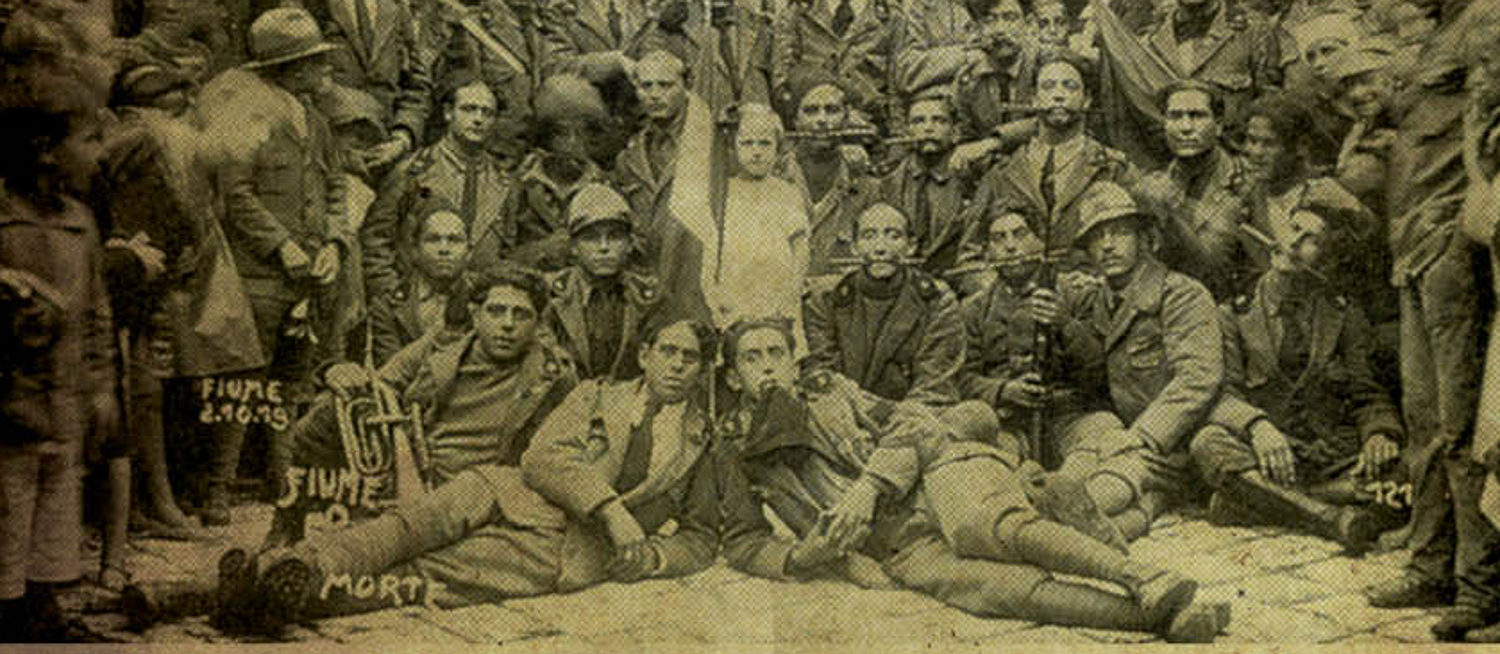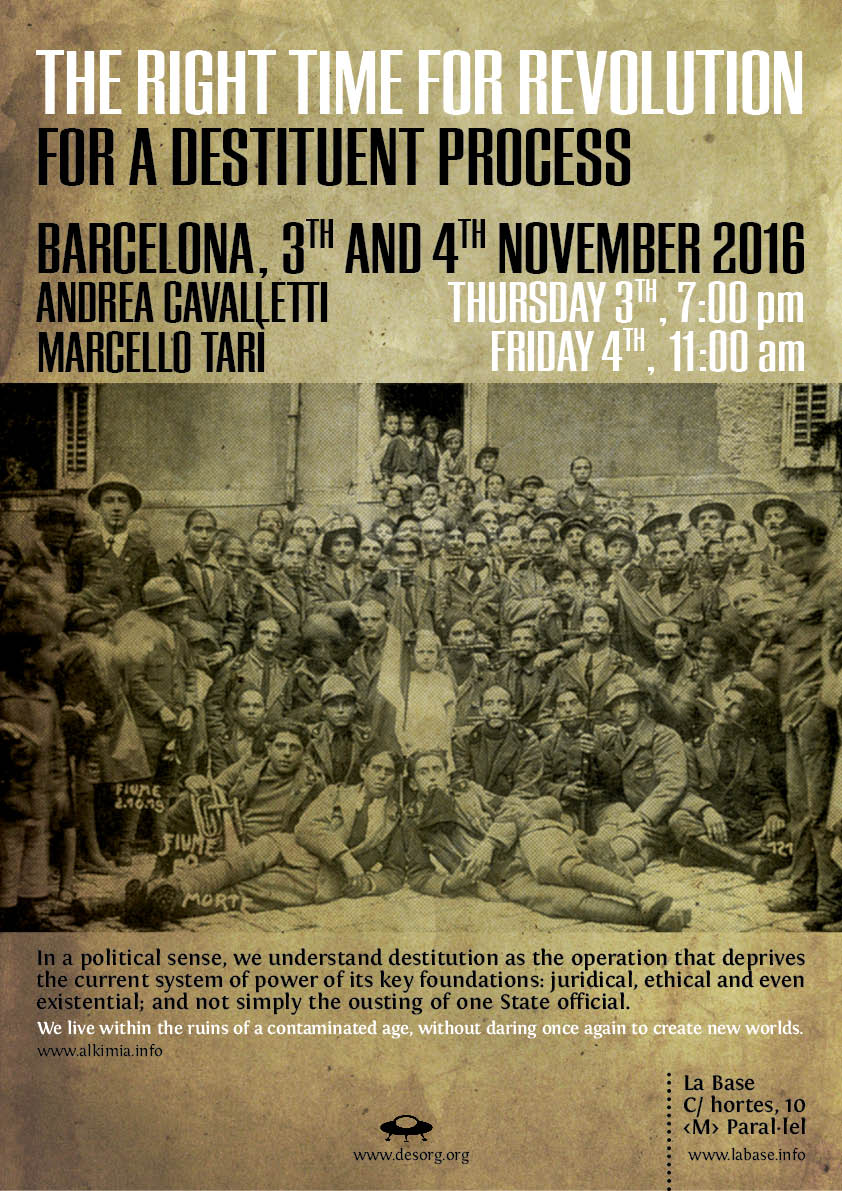Per un procés destituent

-
Convidem aquests dos autors italians, representants d'un pensament contemporani fort, que s'obre com a perforació de l'arc que es dibuixa entre les obres d'Agamben i del Comité Invisible; o ampliant aquest mateix arc, entre els anys Setanta italians, de l'Autonomia i les seves feministes, de Tronti, de Pasolini, així com dels autors francesos, de Debord, Foucault i Deleuze-Guattari, fins a una actualitat on batega amb dificultat el crit del pensament de l'època de les guerres civils mundials, a principis del segle XX, i el de l'antropologia, conjugat amb la inspiració que ens arriba des de fora i contra la civilització occidental, des del moviment indígena, kurd, decolonial.
Convidem aquests dos autors per pensar plegats el temps just de la revolució i per apel·lar a un procés destituent. Però, per què ara, quan tothom parla de la necessitat d'un «procés constituent», i de la creació d'un nou Estat? Doncs precisament perquè la tasca del pensament, deia un dels pròpiament filòsofs del segle XX, no és una altra que «violentar la realitat». Tasca per a un temps que si d'alguna cosa no està mancat, com sabem, és de violència.
Vivim, com diu un amic, en una època global. Allò que la caracteritza és tant la interdependència de les reaccions i dels fenòmens com la profunda «crisi» de la civilització occidental. Encara que per al pensament contemporani que s'apressa per trobar una eixida a la civilització, ja no es tracta només d'una «crisi», sinó d'un veritable camp de ruïnes, existencial, i al mateix temps ètic i polític. Angoixa, tristesa, confusió, depressió no són només malalties dominants del temps, són els signes d'un naufragi.
Davant d'aquesta perspectiva, el compromís amb la justícia ―com a estat de coses en el món i no com a castic o retribució―, propi de tot pensament veritable, ha de col·laborar amb l'època en la tasca d'orientar-nos dins d'aquest camp de ruïnes.
En diàleg amb Walter Benjamin i Furio Jesi, ―autors dotats d'aquella «sublim doble vista» de la que parlava Ortega y Gasset, «que permet albirar en un determinat present estrats remotíssims de l'existència humana»―, els nostres convidats, Andrea Cavalletti i Marcello Tarì, durant les dues sessions del seminari, plantejaran una genealogia política de la destitució així com tot el que està en joc en la determinació del temps just de la revolució.
Els dies 3 i 4 de novembre, a Barcelona, a La Base. C/ les Hortes 10, Poble Sec. <M> Paral·lel.
Dijous 3, 19 h. Divendres 4, 11 h.
El dijous a la tarda presentaran el tema en dues conferències obertes amb un debat posterior, a la sala gran de L'Ateneu La Base.
El divendres al matí, amb un horari especial a causa d'exigències d'agenda, farem una trobada oberta. Amb la idea de continuar de manera informal amb les qüestions generades en les conferències del dia anterior i aprofundir en el debat.
Andrea Cavalletti és professor d'estètica i literatura italiana a l'Institut Universitari d'Arquitectura de Venècia. Ha curat l'edició de diverses obres del Furio Jesi, com Spartakus (AH editora 2014), i ha editat assajos de filosofia i crítica literària. Adriana Hidalgo editora ha publicat Mitología de la seguridad. La ciudad biopolítica el 2010, Clase. El despertar de la multitud el 2013 i Sugestión. Potencia y límites de la fascinación política el 2015. – Estarà a Barcelona entre el 2 i el 5 de Novembre.
Marcello Tarì és un investigador autònom. Ha publicat Movimenti dell'Ingovernabile, Ombre corte, Verona 2008 i més recentment Autonomie!, La Fabrique, Paris 2011 – Il ghiaccio era sottile, edició italiana el 2012, traduït també al portuguès, així com al castellà, el 2016, a Madrid, amb Traficantes de sueños, com Un comunismo más fuerte que la metrópoli. – Estarà a Barcelona entre el 28 d'Octubre i el 5 de Novembre.
Invitació al seminari: http://www.alkimia.info
